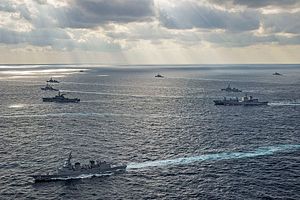With North Korea continuing to ramp up ballistic missile tests in 2017, American and Japanese policy actors face new pressure to address the growing North Korean nuclear missile threat. In fact, former Japanese Defense Minister Itsunori Onodera of the ruling Liberal Democratic Party (LDP) spent the May (Golden Week) holiday in Washington explaining his LDP study group recommendation for Japan to consider acquiring for the first time counterattack capabilities against enemy targets, in addition to expanding missile defenses.
This could be a major step for Prime Minister Shinzo Abe — who has been seeking to reinterpret and revise Japan’s post-war pacifist constitution — as well as a boon for U.S. policymakers looking for new avenues to pressure North Korea. But is it worth the potentially high political and fiscal costs for the Japanese government to pursue missile strike capabilities and enabling infrastructure?
Both U.S. and Japanese policymakers should realize that while Japan’s acquisition of long-range strike capabilities is not a silver bullet to deter North Korean aggression, such acquisition can play a positive role when considered within the larger context of the U.S.-Japan security alliance. With this in mind, the question must go beyond the North Korea issue and be reframed as part of a broader discussion on Japan’s security role in the Asia-Pacific.
The Strike Capability Debate in Japan
Although the U.S.-Japan alliance traditionally delegated the “spear” role of offensive capability to the United States and the “shield” role of self-defense to Japan, the nuclear threat from North Korea is causing Tokyo to consider some adjustments to this division of labor.
Since the 1950s, some Japanese politicians and bureaucrats have argued that offensive strikes are constitutional as long as they were for self-defense and there was no other way to defend against an attack. From this perspective (especially after years of missile defense investments), Japan must wait to be attacked before it could strike back in an effort to limit additional enemy launches.
While this theoretical strike capability gained support from nationalists and those who sought ways to hedge against U.S. disengagement, Japan’s government never deemed it necessary — instead investing heavily in ballistic missile defense (BMD) and a stronger U.S.-Japan alliance. But as recent advances in North Korean missile technology could potentially overwhelm any Japanese BMD, some policymakers in Tokyo are seeking a more comprehensive deterrent.
Domestic opponents of acquiring strike capabilities have argued that such technologies could exacerbate regional tensions and will not be an effective deterrent anyway, due to North Korean missile technology improvements and insufficient Japanese intelligence, surveillance, and reconnaissance (ISR) capabilities. North Korea has made progress fielding mobile missile launchers, solid fuel technology, and submarine launch capabilities, which will make attempts to completely destroy North Korean attack capabilities via a quick-reaction strike increasingly difficult and improbable. North Korea’s elaborate network of tunnels and underground facilities further complicate the challenge, suggesting a truly indigenous and comprehensive Japanese counterattack capability would be exceedingly expensive.
Bringing in the U.S.-Japan Alliance Perspective
But the value of a Japanese strike capability acquisition lies less in the ability to prevent any harm to Japan via pinpoint strikes, and more with the broader picture of U.S. and Japanese security cooperation for a wide range of contingencies. Japanese acquisition of some offensive capabilities can lead to a more integrated security partnership that better synergizes the two nations’ different strengths and technologies. Such a combination could bolster the general deterrence effect of the alliance in the Asia-Pacific if it improves alliance readiness, interoperability, and mutual confidence. It can also improve allied combat effectiveness if deterrence fails. North Korea would be the primary focus, but it could bolster deterrence in the East China Sea as well.
Still, the downsides to strike capability acquisition — including cost and regional concerns — are notable. Even with Abe’s announcement last month lifting Japan’s defense spending restrictions, the high cost of acquiring a functional missile strike system raises the question about whether such systems are worth the opportunity cost. With the potential for duplicate ISR capabilities and other redundancies between American and Japanese forces, limited funding meant for strike acquisition could possibly be better spent in other defense areas including BMD, space, cyber, and maritime security. Additionally, any Japanese military acquisition must consider whether the strategic gains from any offensive capabilities outweigh the increasing worries of neighbors such as China and South Korea, who are historically wary of any Japanese remilitarization.
While the United States should be open to sharing the “spear” with Japan as a next step for the alliance, the allies need a thoughtful conversation about how Japanese missile strike or other offensive technologies can complement existing alliance capabilities. This was also a part of Onodera’s message in Washington. In light of the fiscal and geopolitical costs, Japan should move toward a measured investment in strike capabilities within the existing alliance framework to ensure the systems’ costs do not outweigh its gains, complemented by other practical military acquisitions.
James L. Schoff is a Senior Fellow in the Asia Program at the Carnegie Endowment for International Peace and a former Senior Advisor for East Asia Policy at the U.S. Department of Defense. David Song is a Jr. Fellow in the Asia Program at Carnegie.

































